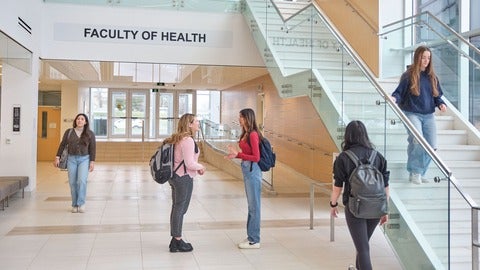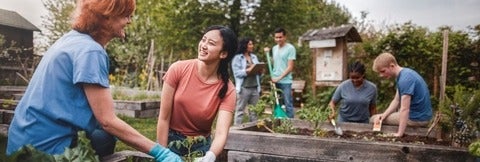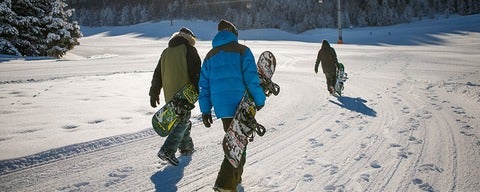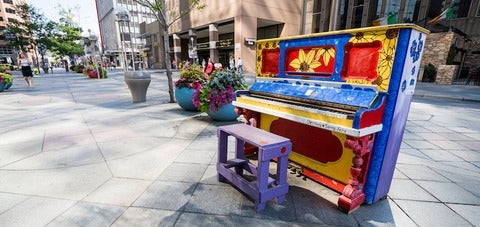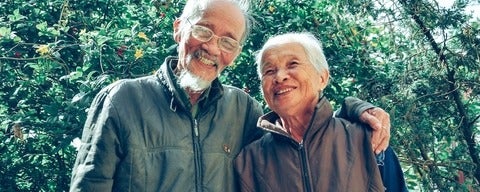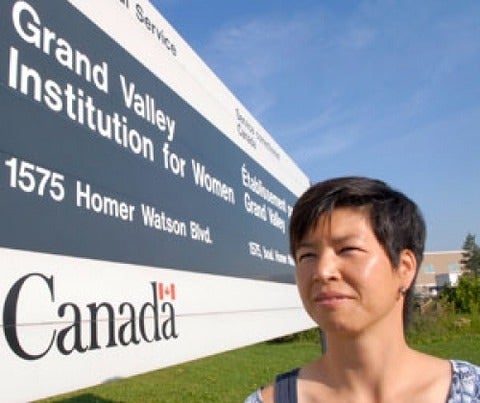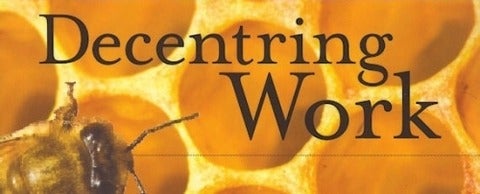New year’s resolutions? Add social fitness to the list
Dr. Troy Glover shares key strategies for improving health and well-being this year through collective community participation.
Cultural connection key to healthy aging for Indigenous elders
New research seeks to provide seniors with a sense of belonging through culturally grounded interactions, activities and spaces.
Think your BMI reflects your health? Think again, study warns
With new data showing two in three Canadians are overweight or obese, a University of Waterloo study cautions against using BMI.
Dr. Troy Glover ranked most influential scholar in social capital field
Recreation and Leisure Studies Professor Troy Glover was recently recognized as the top scholar in the field of social capital, based on total publications, citation impact, and both h-index and g-index in a recently published systematic review.
From puck drop to brain pop
New study from Spectator Experience and Technology Laboratory shows how a hockey fan’s brain reacts to key moments in games.
Dr. Karla Boluk receives Early Researcher Award
Recreation and Leisure Studies associate professor Dr. Karla Boluk has received an Early Researcher Award valued at $100,000.
Dr. Heather Mair named TALS Fellow
The Academy of Leisure Sciences (TALS) presents Heather Mair with a teaching Fellow award for her outstanding work in the field of leisure.
Inspiring Canadians to re-imagine their neighbourhoods
Recreation and Leisure Professor Dr. Troy Glover has co-created a tactical guide called Activate Your Neighbourhood that aligns with Canada's physical activity strategy.
Students who played sports before the pandemic did better during lockdowns
Researchers at the University of Waterloo found that participation in activities such as fitness classes and intramural and drop-in sports before the pandemic was linked to lower levels of stress and higher levels of perceived competence to handle challenges and master school workload during the lockdown.
How new multi-sport facilities can be used after major events
Researchers found that factors such as the location and design of the facility, the formal agreements between operating groups and the breadth of sport and recreation programming offered at the facility all contributed to promoting a legacy of participation post-event.
Rethinking dementia and dementia care
By 2031, more than 1.4 million Canadians will be living with dementia. Yet even with the prevalence of this condition, many myths and a great deal of stigma remain.
New study examines socially conscious dating apps
Researchers from the University of Waterloo and Bumble have partnered to study how interacting in a space that promotes justice and social equity affects dating.
Q and A with the experts: COVID-19 means we need a “winter strategy” to keep us outside and in touch
As we brace for another possible spike in COVID-19 infections this winter, Professor Troy Glover says we need a reason to bundle up and go outside.
Documentary showcases that 'Music is Life' in a dementia-care centre
“Music is a universal language that can move us physically, emotionally, relationally in ways that other things can’t,” says Sherry Dupuis, one of the researchers involved with a new documentary on the benefits of musical engagement for those living with dementia. Music is Life premieres on World Alzheimer’s Awareness Day, September 21.
Q and A with the experts: neighbouring in the time of COVID-19
Before the pandemic, when we occupied the same physical space as others, we paid little attention to them. Now, under the current circumstances, we’re more attentive to each other — we’re actually less socially distant while being more physically distant.
Study identifies way for employers to retain casual workers
Job enrichment may be an important tool for retaining seasonal frontline staff, according to a new University of Waterloo study.
Voucher programs can help leverage participation in new sport opportunities
Cities that want to get the best use of sport facilities built to host novel events might want to give out vouchers for free trials to spectators.
Urban imagineering brings public spaces to life
When vacant public spaces across the region turn into vibrant hubs of activity this summer thanks to $60,000 in placemaking grants from the city of Kitchener, a new website built at Waterloo is ready to track all the action.
Waterloo leisure studies ranks among top in world
WATERLOO, ONT. (Thursday, March 9, 2017)
The University of Waterloo is one of the best schools in the world for subjects related to Hospitality and Leisure Management, according to new rankings released today.
The rankings, published by the UK firm Quacquarelli Symonds (QS), place Waterloo 13th in the world — and first in Canada — for Hospitality and Leisure Management Studies.
Can two countries host the Olympics Games together?
Last year, the International Olympic Committee (IOC) approved new regulations allowing multiple cities — and even countries — to partner in hosting the Games.
New anonymous online survey aims to protect athletes from doping
The former director of athletics who navigated the University of Waterloo’s football team through the worst doping scandal in Canadian university history, has developed an anonymous online survey for teams that he hopes will protect athletes from dangerous behaviours.
Being out affects LGBT retirement plans
Lesbian, Gay, Bisexual and Trans (LGBT) Canadians are less uncertain about their retirement years if they have openly discussed their LGBT identity with family and friends, according to a breakthrough study by the RBC Retirement Research Centre at Waterloo.
Try the Track project brings cycling to recreational athletes
Milton's new velodrome could be a boon to track cycling long after the Pan Am Games are over, says Waterloo researcher.
New play challenges dementia stereotypes
In January, the research-based drama Cracked: New Light on Dementia will run at several venues in Toronto, including an event at the Ontario Science Museum.
Curling helps fight seasonal depression for rural women
Curling unites rural women and offers them health benefits beyond the physical, according to Waterloo research.
Crunched for time? Commuting linked to lower life satisfaction
The more time you spend getting to and from work, the less likely you are to be satisfied with life, says a new study by Applied Health Sciences faculty, Margo Hilbrecht, Steven Mock, and Bryan Smale.
Sacred waters run deep
Bryan Grimwood has been working with Aboriginal communities connected to the Thelon to cultivate enhanced understanding of, and responsible relationships to, this sacred and changing place.
50 Shades of Grey is not a black and white issue for women
50 Shades of Grey has been credited with sparking a new era in women’s sexuality. For the first time women can claim — some without shame — that they read sexually explicit material and enjoy it.
Research helps boomers plan for retirement
People shouldn’t think about retirement as one long vacation, says Roger Mannell.
Sports increase well-being of gay and lesbian athletes
Involvement in lesbian, gay, bisexual, or transgender (LGBT) sport groups makes gay and lesbian athletes feel better about their sexual identity and helps them come out in their everyday lives, according to research from the University of Waterloo.
New website assists those with dementia and their families
A diagnosis of Alzheimer’s disease or a related dementia leaves both the person with the illness and their family members with many unanswered questions.
More than s’mores
Summer camp is about more than s’mores and sing-alongs. Just ask Troy Glover; one of the recreation and leisure studies professors behind the multi-phase Canadian Summer Camp Research Project.
Building the Canadian Index of Wellbeing
The Canadian Index of Wellbeing Network, directed by recreation and leisure studies professor Bryan Smale, has developed a composite index to benchmark the nation's state of well-being.
Online social networking sites redefining motherhood
Today technology drives motherhood and motherhood drives technology,” says Parry, an associate professor of Recreation and Leisure Studies in the Faculty of Applied Health Sciences.
Changing the culture in long-term care
As the Canadian population continues to age, more and more people will be diagnosed with an illness causing dementia.
Women struggle with stigma of prison
Uncertain Futures: Women Leaving Prison and Re-entering Community, a report co-authored by Susan Arai, explores the “importance of building relationships to bridge the chasm between women and their community” after they are released from Grand Valley Institution for Women in Kitchener.
Decentring Work
Decentring Work, a new book edited by recreation and leisure studies professors Heather Mair and Susan Arai with Donald Reid of the University of Guelph, questions how and why we have come to value paid employment as the marker of social success and individual self-worth, and investigates the role that leisure might play in its stead.



